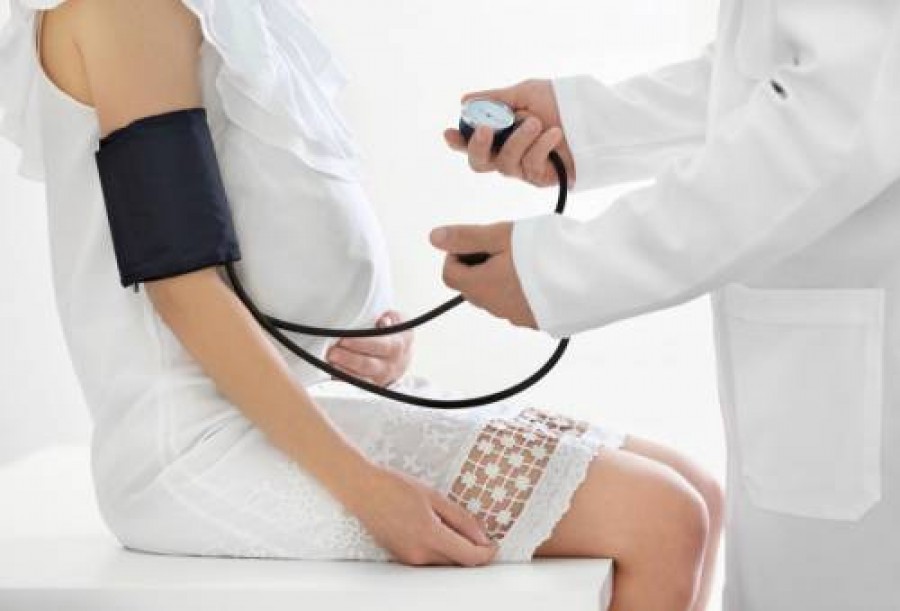Hypertension and Pregnancy

What is Hypertension during Pregnancy?
When the blood pressure of a pregnant woman reaches a level of 140/90mmHg or more, it is known as hypertension during pregnancy.
Causes of Hypertension during Pregnancy
In about 95% of all cases of hypertension, the cause is unknown. However, researchers have been able to find some factors which lead to this condition, as mentioned below.
Being overweight or obese
A sedentary and unhealthy lifestyle of a pregnant woman, would lead her to gain weight. This increase in weight causes her to suffer from several health issues, including high blood pressure.
Smoking
Cigarette smoke has a chemical called nicotine in it. Nicotine has two harmful effects on the human body. The first one is that it is highly addictive, due to which smokers find it extremely difficult to quit smoking.
The second one is the ability of nicotine to cause narrowing of blood vessels. This narrowing leads to hypertension as well as other health problems.
Drinking Alcohol
Everyone knows that excessive alcohol is harmful to the human body. And if a pregnant woman consumes alcohol, especially in excessive quantities, it would cause damage to the blood vessels of the pregnant woman. The blood vessels of the pregnant woman consuming excessive amounts of alcohol tend to become narrow which in turn leads to hypertension in the pregnant woman. To learn more about how alcohol usage affects pregnancy, read here.
First Pregnancy
Many women might be unaware of the fact that a woman who gets pregnant for the first time is the most likely candidate to suffer from a condition known as preeclampsia. Preeclampsia causes symptoms such as hypertension and protein in urine.
Family History
If the pregnant woman’s family members suffer from or have suffered from diseases such as chronic hypertension, preeclampsia or issues related to the kidney, chances are high that she too would experience the same problems soon.
Age
A lot of research has been done to find the link between hypertension and pregnancy. There is proof that as a woman ages, the chances that she would suffer from hypertension increase as well, particularly if that woman is pregnant.
Signs and Symptoms of Hypertension in Pregnancy
In most cases of hypertension, the patient does not present with any symptoms. Another term used for hypertension is “The Silent Killer.”
The most common signs and symptoms of hypertension, especially in pregnant women, are headache and dizziness.
Diagnosing hypertension in a pregnant woman
To diagnose hypertension, check the blood pressure of a person at least 3 times by using an instrument called a sphygmomanometer. If the readings are above 140/90 mmHg, it confirms that the pregnant woman is hypertensive.
Management of Hypertension during Pregnancy
There are ways in which we can manage hypertension, a few are mentioned below:
Decrease the intake of salt in the diet
Decreasing the amount of salt consumed by a pregnant woman has a positive impact on her body as it lowers her blood pressure.
Do not take stress
Stress tends to cause narrowing of blood vessels, which in turn, leads to hypertension.
Exercise regularly
By exercising regularly, we prevent a woman from gaining extra weight. This is nice activity as it strengthens the woman’s body and prevents hypertension. To learn more about safe exercises during pregnancy, read here.
Treat the diseases which affect the kidney and liver
Diseases which occur in the kidney and/or the liver tend to increase the blood pressure of a person. Treating such diseases would bring the blood pressure back to normal.
Quick Summary of Hypertension in Pregnancy
The table below shows us information regarding hypertension in pregnant women:
| Hypertension in Pregnancy |
Normal |
Pregnancy Induced Hypertension (PIH) |
Preeclampsia |
Eclampsia |
| Severity | Normal | Moderate | Severe | Very Severe
|
| Blood Pressure
(mmHg) |
120/80 | More than 140/90 but
Less than 160/110 |
More than 140/90 (+symptoms)
Or More than 160/110 [Sustained BP] |
More than 160/110
[Sustained BP] |
| Symptoms | None | None | Headache
Abdominal pain Blurred vision
|
Seizures
|
| Urine Test | Normal | Urine collection->300mg/24hr Protein in urine,
|
Urine collection- >5g/24 hr protein in urine | Urine collection->5g/24hr protein in urine ,urine dipstick 1-2+ protein, |
| Complete blood count(CBC)
|
Normal | CBC-normal
|
CBC-increased platelets
|
CBC-Raised platelets,
|
| Liver Function tests(LFTs)
|
Normal | LFT-normal | LFTs-raised | LFTs-abnormally raised
|
|
Management |
None | <37 weeks gestation–observation & hospitalization
>37 weeks gestation-immediate deliver the baby
|
Requires Hospital admission
Lower blood pressure
Prevent seizures
Immediate delivery
|
Treat seizures
Lower blood pressure
Immediate delivery is the best treatment |



